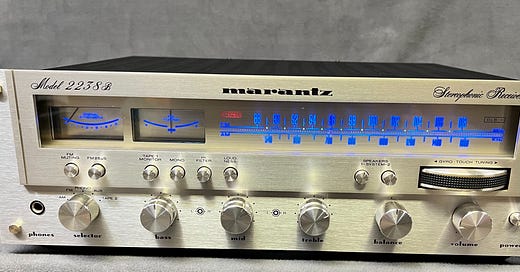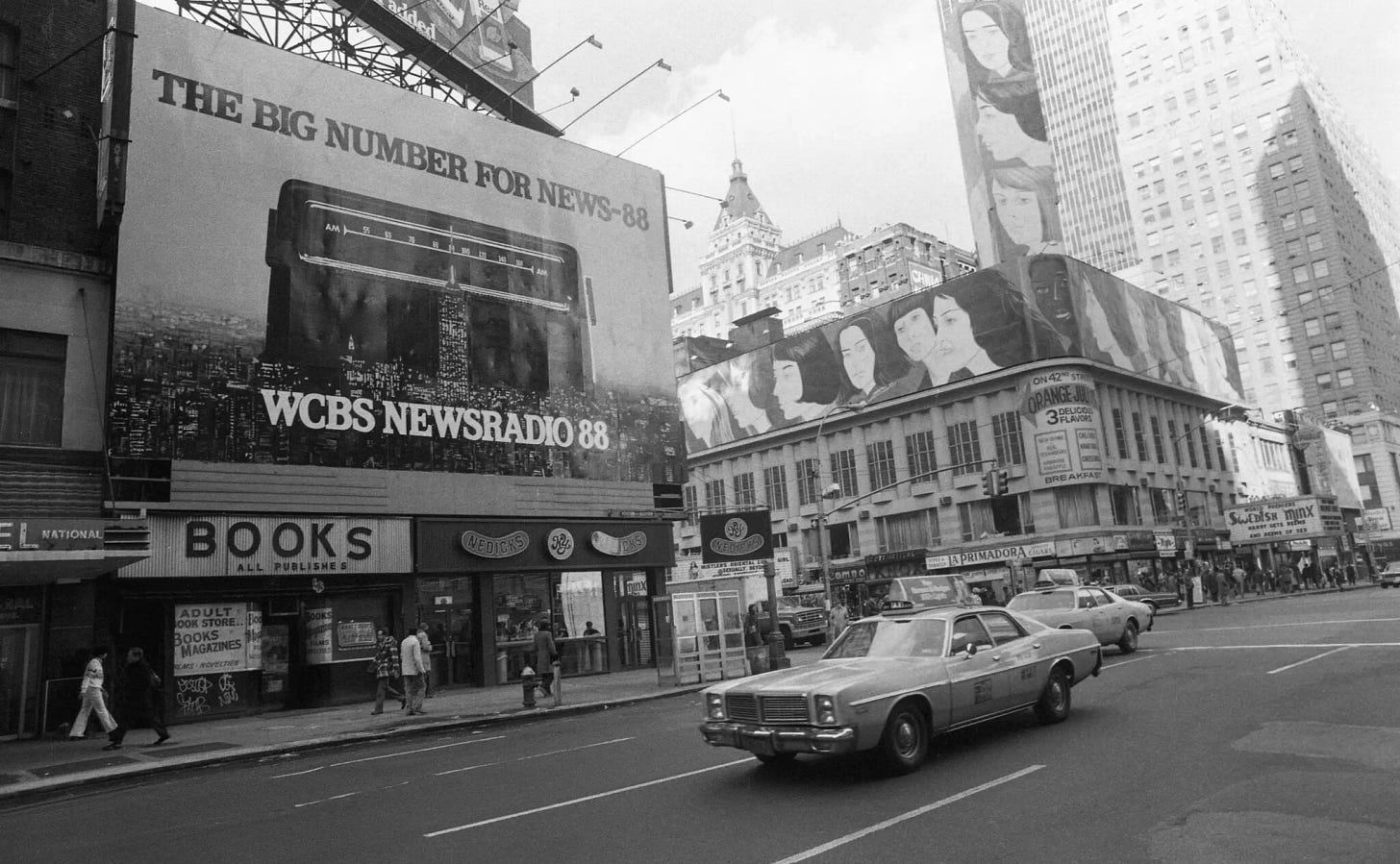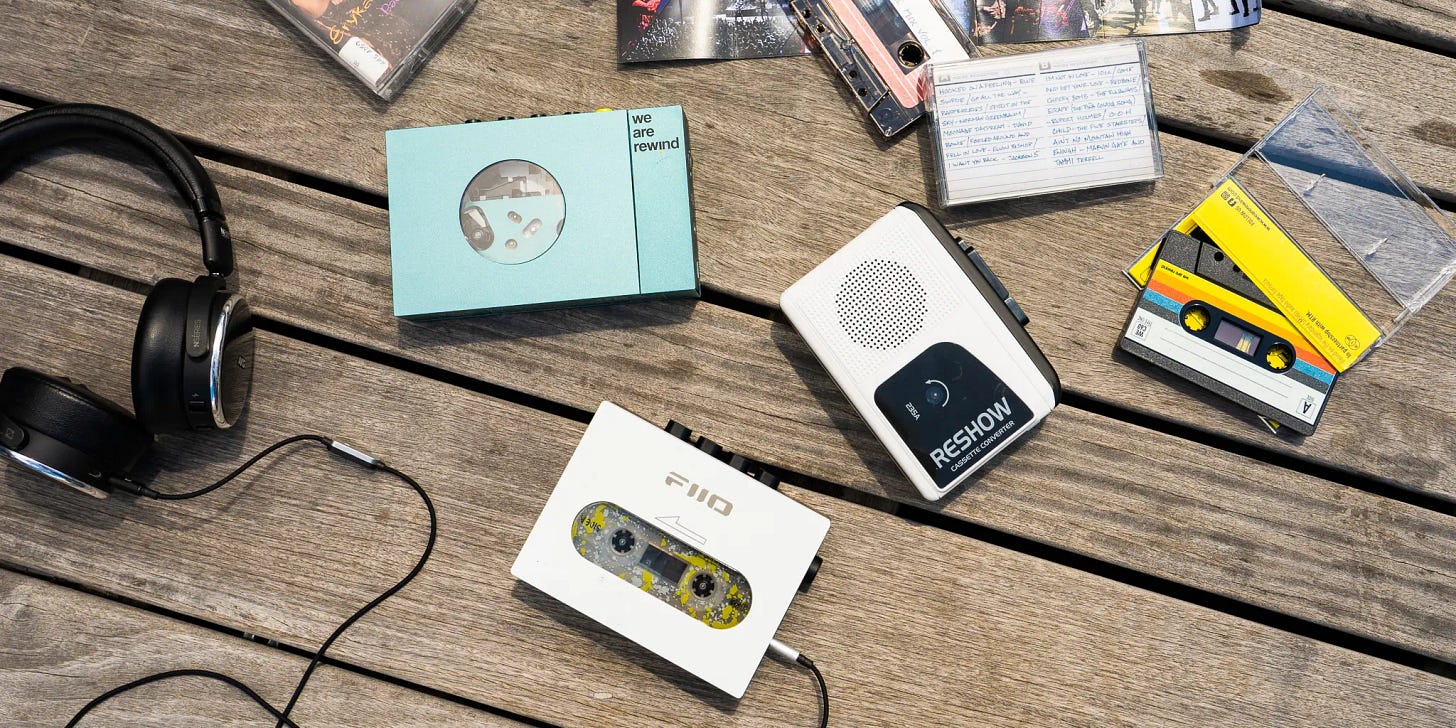I. How It Feels
Let’s start with the choreography of radio.
I like to wake up in the morning, walk towards my bathroom, and on the way there, reach my left hand up to a just-above-shoulder-height shelf, and push a single button to turn on the radio. More specifically, to turn on the Marantz 2238B Stereo Receiver that a former roommate left for me, bless him.
My phone is not involved, there is no need to swipe off notifications or turn on a speaker or make sure everything is “in range and connected.” In fact, that is rather the point: the radio sits patiently, I make a single motion (plus or minus some fine-tuning of the dial placement) and my morning proceeds seamlessly.
This is a good time to mention that yes, I am aware that possibly my tech skills could improve, that perhaps there are equally seamless ways to turn on a live music feed, and many stations have an alarm feature. I cannot tell you how uninterested I am in such tech “tips.” I would be better off if all things operated like a toddler’s busy board. If you are offering to come to any of my residences and set up a single-button system for me that requires no other knowledge to operate on my end, then we can talk rates.
Which brings me back to the choreography of radio — which is maybe another way of saying UX, but you see, I am deliberately trying to steer us back towards human-centric vocabulary and not our degraded cyber-hybrid forms.1 A point in favor of the radio’s choreography is that it (albeit briefly) expands my form. I reach upwards for the button and can keep my eyes and gait moving forward. I don’t even have to look over, I can find the switch by feel. I get a tactile sensation that is different from the never-ending thumb-swipe (or its cousin, the increasingly-frustrated repeated tap.) There is something satisfying about the feedback of pushing a button, feeling it spring back against my touch, the texture of brushed steel instead of dull glass.2
And, again, it’s a single step, no fiddling around with connecting speakers, searching for a playlist, waiting for a stream to load. Yes, it is also possible that I love radio because I am impatient. When I want something, I want it that instant, with as few steps as possible. Perhaps counterintuitively, I find that radio has less lag than a live stream or digital system of any kind, even if you can measure it in nanoseconds.
Aha, but why then do I tolerate the need to sometimes refine the dial placement? Why do I have so much grace for static? Because I’m a superior enlightened being, obviously. HAHAHAHA no, quite the opposite. My best guess is, even fidgeting with the dial is a unilateral process — I don’t need to navigate multiple screens or apps, neither the problem nor its solution is a great mystery. Furthermore, the tactile response on the dial is equally pleasing, smooth, but with some springy resistance. Getting it to just the right placement is very satisfying.
If I had to sum it up I would say, I feel more in control with a radio unit. More capable of making the machine do what I want, sooner.3 More embodied, even in tiny ways.
II. Other People
I prefer to listen to live chatter when I’m getting ready in the morning. It feels like I am connecting to the world, humans who are THERE, right now, not the digital void.
I should say, mostly what I’m referring to when I say radio, in terms of content, is public and/or nonprofit radio. In New York, my three stations are WNYC (I would do literally anything for Brian Lehrer), WBGO, the legendary 24-hour jazz station that broadcasts out of Newark, and WQXR, the classical music station. Their counterparts in my Vermont life are all Vermont Public.
Let’s linger for a moment on that name, Vermont Public. This is a super-rural mountainous state with a population of 600,000, spread over quite a few small but vibrant towns. Some areas are very sparsely populated, but even if you’re humping the Canadian border up in Newport or mining marble in Rutland, there is a station that will reliably reach you. I am of the belief that this kind of dispersed yet unifying symbol doesn’t just serve a hypothetical “public” — it creates one.
The immediacy of other people when we listen to the radio is absolutely vital, on the micro and the macro level. By micro, I mean, it offers us an intimacy that many of us crave these days. During a WBGO membership drive in 2020, new members like me were invited to call or text in their reasons for supporting the station. Mine was that the voices of the station, as well as the music, were wonderful companions, especially during that lonely pandemic time.
I found out just how many people felt that way when the venerable AM station, WCBS, announced its closure as a news station (it was replaced by an ESPN sports talk format.) The New York Times article covering WCBS’s end did a fine job noting that its informational broadcasts of traffic and weather kept people plugged into the daily, even hourly rhythms of the city. Its patter suffused cabs, bodegas, people’s morning ablutions.
One of the reporters, Peter Haskell, described the intimate, personal quality of radio: “You’re having a one-on-one conversation drawing listeners in.” This mattered to listeners like Ralph Katz: “With WCBS, there’s always someone there in a newsroom on the other end of the speaker.”
But it was in the comments where I found visceral heartbreak over the loss of this reliable aural companion:
“The humor, the repartee, the warmth and accuracy of their reporting…It was a dear friend, knowledgeable, trustworthy, resilient.
A mainstay, a constant, and a trusted source. Always there for me.
For those of us who listen daily, it's a personal loss.
Early in the morning, late at night, the professional hosts and correspondents were reliable, trusted friends who made sense of the madness.
Like Losing Family. Heartbroken.”
The two that moved me the most were ones who deftly captured the reassurance that radio provides, that someone else is with you, somehow,
A source of solace, peace and comfort for many day and night. A trusted “friend” for many that lacked a friend in the moment. — Mike Trailor
and that you are having a shared experience even when you feel alone.
Radio is a communal experience. It's reassuring to know that thousands (or millions) are hearing the same information (news, sports, entertainment, etc.) at the same time - and we all get to interpret and discuss it with our fellow humans to come to some form of common framing and reference. — Dave
Dave’s comment is a spot-on paraphrasing of how Hannah Arendt understood politics. The Arendtian public realm is where we come together for exactly these purposes. A “public realm…gathers men together and relates them to each other,” it is composed of things that stabilize human life, give us a shared reference point of reference for whatever is happening to us, collectively, and how we might go about responding to it.
The thing that make us feel connected to a voice in the night are also the things that make us feel connected to our fellow citizens, at once we are sharing a common world with them and someone is always present for us in our private ones. Kind of miraculous that one technology can do both, and that is entirely due to its in-real-time dynamism, as well as its various invitations to interaction. Anything that makes us feel less lonely and more grounded is more valuable than gold.
The breeziest, sultriest, most evocative version of this comes from another 20th-century heroine, Joni Mitchell. One of my favorite songs of hers is “You Turn Me On, I’m A Radio.” It’s playful and witty and feels the moment on a road trip when you’re thinking about a lover and a little smile creeps across your face. Tell me a better come-on line than this — and notice that this lyric relies entirely on the metaphor of a radio station where someone is standing by, ready to take your call:
If your head says, "Forget it"
But your heart's still smoking
Call me at the station
The lines are open
Don’t go by the words on the page. Listen to Joni throwing her head back and winking that line at you.
III. Reject Digital Modernity, Embrace Analog Tradition
I’ll be honest, this is getting a little long and I haven’t done all the reading I need to for this section. I’ll write another post after I read Liz Pelly’s new book, Mood Machine: The Rise of Spotify and the Cost of the Perfect Playlist. There is a LOT to say about Spotify and other streaming platforms’ business models, their exploitation of musicians, their flattening of culture. I’m confident Pelly’s book covers those better than I can right now.
But speaking for myself, I think it’s fucked up that we feed the Spotify algorithm a bunch of data, and then it shows us how much data we served it and everything they learned about us from us providing that data, and because it comes in shiny graphics and sans-serif fonts we think it’s cool, and that’s how we become trained to love surveillance capitalism.
I’m not saying I NEVER use Spotify or Pandora4, I’m saying radio is better because I don’t always want to make my own playlists. I don’t want a faceless computer shuffling my options for me, and I don’t want to be floating in my own little curated world, not in the least because making every choice is exhausting and time-consuming. I have a huge backlog of podcasts, and long queue of things to listen to, and the pressure to select among them every time starts to feel like as much fun as getting to “research” and “select” my health insurance “options.” Tyranny of choice is still tyranny, even in leisure.
I know all of this has a whiff of the Rockwellian nostalgia that hand-waves away things like racism and housewives’ substance dependencies. I’m also looking at new cars for myself, having reluctantly admitted that yes, I no longer want the awkward dongle-based methods of using navigation or playing music. But I still want push buttons, AM-FM radio, ideally a CD and cassette player.
That’s right, I said cassette player — which are making a comeback. Along with film photography, records, flip phones. The children yearn for digital detox. I just saw someone post that they are moving to Paris and only checking email once a week at the library. Obviously we can’t all do that. But we can note that radio might, could, be part of a resurgence of simpler vintage technologies that help us engage with the world without getting sucked into our phones.
V. How It Sounds
Above the content of what radio plays, there’s a beauty in the word itself. It’s beautiful, replete with full vowel sounds and a lilting rise and fall.
You don’t hear other audio technologies in song titles from Donna Summer to REM to the aforementioned Joni Mitchell. Add to that one my surprise new favorite bands, Malice K, who I saw in Montreal last month with Friend of The Schill, John M.
I love their song Radio because of its deep emo earnestness — my favorite line is “I try hard to be someone else/but someone else is already taken.” It’s the song’s opening line, though, that alludes to the element of surprise — “radio plays my favorite song” — because it’s not remarkable or serendipitous for YOU to put on your favorite song, the radio playing it is the moment when your emotions align with the universe, or you’re reminded of some joy or sorrow buried deep in your psyche.5
Anything I write about music, or much of anything else, must include Mariah Carey (the GOAT), and so I have saved her for last: “We Belong Together” does not work without the wistfulness of
Bobby Womack's on the radio
Saying to me, "If you think you're lonely now"
Wait a minute this is too deep (too deep)
I gotta change the station
She’s caught off-guard, overwhelmed by her longing for her ex, something bigger than her is sending her a message, and it releases her deep yearning.
When was the last time something surprised you with delight, made you more aware of the world around you and how its rhythms might, occasionally, line up with yours?
And when was the last time you felt comforted by the presence of a stranger, part of an experience that connected your soul to others’?
I lied, there is a final song reference: “Are You Out There,” by Dar Williams, who talks about6 how transformative it was to tune into a crackly indie radio station as a teenager, the way you become family when you listen, how DJs educate listeners about the tracks they play. They “bring you in,” and become “first friends” in a new place.
You never know who's still awake
You never know who understands andAre you out there, can you hear this?
Jimmy Olson, Johnny Memphis,
I was out here listening all the time
And though the static walls surround me
You were out there and you found me
I was out here listening all the timeOh yeah I was out here listening
Oh yeah I am out here listening all the time
Cyber-hybrid is a term I have chosen to avoid using “cyborg” in an even remotely disparaging way, as I have the highest respect for Donna Haraway’s work.
My pal Thomas Chatterton Williams wrote a great piece about the pleasures of older cars. (I won’t promise complete integrity of the division between analog and digital.) He referred to newer cars with touch screens, and specifically Teslas, as “basically [computers] that…just happen to perform some locomotive functions,” part of the “iPad-ization of consumer reality.” I have seen tons of commentary pointing out how annoying it is to have our refrigerators connected to our smartwatches, our vacuum cleaners connected to the cloud, a “smart” (read: equipped with digital surveillance) version of every mechanical appliance.
My husband had what’s called ‘mechanical sympathy’ - you intuitively understand what a machine needs to perform at its best, you protect the mechanism’s use and wear through careful, sensitive use. He noted, with great love, that I often have the opposite tendency — mechanical hostility. My feelings about touch screens are kind of what he meant. They really bring out my impatience — but I think underneath that is also a feeling of alienation. If it feels like an item is indifferent to my touch, operates by its own logic that I don’t understand, can’t keep up with my inputs (because I have too many tabs open, maybe), then yeah, I will get irritated. But underneath that is, arguably, a yearning for a machine MORE responsive, more dependent on the subtleties of its human’s choices.
Oh yeah, not content to be contrarian about radio, I also use the way-less-popular streaming service.
Hua Hsu put it nicely in The New Yorker:
Decades ago, when you were listening to the radio or watching MTV, you might encounter something different and unknown, prompting some judgment as to whether you liked or loathed it.
Right now, anything that prompts our judgement, jogging our critical faculties rather than dulling them, allowing us to consciously cultivate and reconsider our tastes and desires, is a good thing. This also connects to the bit about democracy, specifically by way of Arendt — it’s good to navigate contingency, different possibilities and reactions. Our unpredictability is what makes us human, and our ability to accommodate different tastes is what allows us to have a healthy public world.
Williams describes this in her intro to live performances of the song, including her Out There Live album, my favorite to this day, which, punchline of perhaps more importance than a footnote, is not available to stream on any platform.







Hello Amy. First would love to compliment you on The Price of Humanity; I think it's an incredibly important contribution to the ongoing conversation about philanthropy and what it's "for."
I, too, love the sound of human chatter in the morning, but have this week put myself on a pretty drastic news diet to try to protect my nervous system, which means no NPR in the morning (I'm in LA so we're talking KCRW here). For now, it's a trade-off I'm willing to make.
As for radio, I wanted to add to the conversation an internet radio station I've been listening to since the early days if iTunes (!) called Radio Paradise. It's human-powered and ad free; you can donate on Patreon to support them, a la the public radio model. It's eclectic and I continue to discover new artists there. Perhaps you'd like it too.
Amy, your analysis hits home. Brian Lehrer & WNYC is a lifeline for my 100 year old WW2 vet & legally blind father-in-law. He is a daily listener and now frequent caller engaging in conversations covering VA benefits to his experience with tariffs. It keeps listeners engaged and connected in the moment. Personally, 104.3 New York’s Classic Rock station is always on in my car.